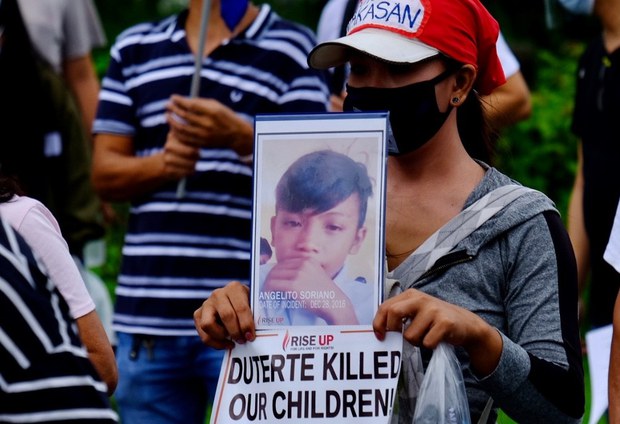Philippines Rights Activists Welcome Independent Findings on Drug-War Killings
2021.11.04
Davao, Philippines
 A protester holds a picture of Angelito Soriano, 15, a victim of an extrajudicial killing during a counter-narcotics operation, at a rally in Manila marking President Rodrigo Duterte’s final state of the nation address to Congress, July 26, 2021.
A protester holds a picture of Angelito Soriano, 15, a victim of an extrajudicial killing during a counter-narcotics operation, at a rally in Manila marking President Rodrigo Duterte’s final state of the nation address to Congress, July 26, 2021.
Philippine activists on Thursday welcomed an independent commission’s investigation that found a pattern of abuse in extrajudicial killings in the government’s war on drugs, as President Rodrigo Duterte again rejected related efforts to charge him before an international court.
Earlier this week, the Commission on Human Rights, said it had reviewed 579 incidents of “drug-related extrajudicial killings” between 2016 and 2020, and found signs of foul play in dozens of deadly police operations.
Records of 87 victims showed they were shot multiple times and in different parts of the body – usually in the head, chest, trunk, and abdomen – and had also suffered blunt-force injuries and lacerations, the commission also said.
“There are also other patterns of discrepancies based on eyewitness accounts during drug operations by law enforcers, including that the alleged operations might have not actually been conducted; that alleged ‘nanlaban’ victims could not have initiated a shootout,” the commission reported. It noted that witnesses had observed the planting of evidence in some cases and that some of the victims likely were not the intended target.
“Nanlaban,” a Tagalog term for a suspect who fought with police, has evolved to mean a suspect who has been killed.
As he oversaw the inauguration of a port project in southwestern Palawan province on Thursday, Duterte insisted that his administration had contained the drug menace. He warned that “drugs would return” if the government relaxed its law enforcement policies against narcotics.
The president will be leaving office after the May 2022 general election, when his constitutionally limited six-year term ends.
“There must be law and order before anything else. Without law and order, there is nothing,” Duterte said in a speech filled with profanity. He reiterated that he would push back against any effort to bring him before the International Criminal Court in The Hague to face trial over the killings in his administration’s war on illegal drugs.
“I will never accept their jurisdiction, even if hell freezes over. I will not agree to their nonsense. I do not have a problem if they say I sinned. That is admitted, either intentionally or unintentionally,” the president said, referring to the ICC probe.
In September, the ICC approved a request by its former chief prosecutor to investigate extrajudicial killings tied to the drug war.
“They want me to go to prison. Well, maybe. But it has to be a Philippine prison and I must be judged by a judicial court of the Republic of the Philippines and I must be prosecuted like me when I was a prosecutor,” Duterte said. “It should be Filipino.”
About 8,000 suspected addicts and dealers have been killed in what police have claimed to be shootouts since Duterte took office in 2016 on a campaign vow to clean the streets of drugs. Rights groups, meanwhile, said the number of those killed could be between 20,000 and 30,000, including many killed by vigilantes.
Duterte has denied sanctioning those killings and said they could have been carried out by rival gangs to discredit the government.
“In raids where there were drug lords killed, that is mine, I assume full responsibility. And if there’s anybody who should go to prison, it should be me – not the police nor the PDEA, it should be me because they were acting upon my orders,” Duterte said, referring to the Philippine Drug Enforcement Agency.
‘Awarded, rewarded or recognized’
Gwendolyn Pimentel-Gana, a human rights commissioner, said 77 of 90 police reports that the commission secured showed that officers involved in killings “are either to be awarded, rewarded or recognized.”
Cristina Palabay, leader of the Filipino rights group Karapatan, told BenarNews that the findings confirmed what she and others had suspected – that the killings were widespread, sanctioned and that police involved were either promoted or rewarded.
“Clearly, the killings were and are still being committed with impunity,” she said. “The findings are significantly more detailed and wider in scope compared to the earlier findings from the Department of Justice’s review, this despite the recurring obstacles in accessing police records regarding these cases.”
A justice department report last month of deadly officer-involved shootings stated that 154 officers had allegedly staged shootouts during anti-drug sting operations.
Parts of the 20-page report were made public then in what the department and Duterte’s government said was an effort to be transparent.
On Wednesday, Gen. Guillermo Eleazar, the national police chief, said officers respect the investigation by the human rights commission.
“We in the Philippine National Police would also want to know the truth because these allegations of human rights and extra-judicial killings that have been hounding us for more than five years have resulted in the sweeping generalization that all our operations against illegal drugs are tainted with abuses,” Eleazar said.







